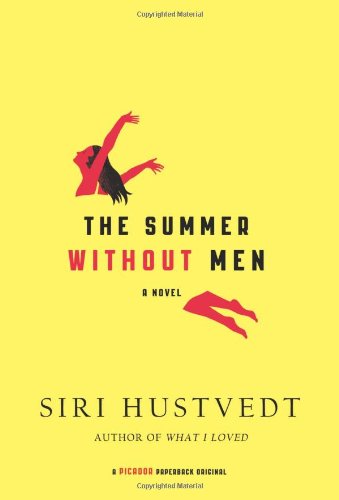
The Summer Without Men
A Novel
کتاب های مرتبط
- اطلاعات
- نقد و بررسی
- دیدگاه کاربران
نقد و بررسی

February 14, 2011
A theatrically manic poet turns heartbreak into an intellectual endeavor in Hustvedt's intellectually spry latest (after The Sorrows of an American). Fresh out of the hospital at age 55 following a breakdown brought on by her husband's departure for a young colleague referred to as "The Pause," award-winning poet and Columbia professor Mia Fredricksen flees Brooklyn to spend the summer in her Minnesota hometown. There she is in the company of her mother and four other feisty old ladies, the young mother next door, and the seven hormone-addled pubescent girls enrolled in her poetry class at the local arts guild. Mia sorts out her agony as only a scorned woman with a Ph.D. in comparative literature can—by pouring it through a sieve of poets, philosophers, and critical theorists. At times these references eclipse the presence of the narrator herself, but even this absence becomes the basis for philosophical rumination, as Mia corresponds online with the anonymous—and at times abusive—Mr. Nobody. Though initially trapped in a claustrophobic cerebral solitude, Mia opens up, and, in so doing, lets in some much needed air to a constricted narrative, so that instead of being another novel of a woman on the brink, this becomes an adroit take on love, men and women, and girls and women.

February 1, 2011
Hustvedt (The Shaking Woman, 2010, etc.) explores the Seven Ages of Woman.
Six, actually: No soldier here, though there's ugly conflict among the schoolgirls taking poet Mia Fredricksen's summer workshop. Mia has returned to Minnesota to recover from a breakdown brought on by her husband of 30 years saying that he wanted to take a "pause" in their marriage. She's rented a house near the senior dwelling where her mother now lives in the "independent zone"; the greatest fear of 87-year-old Laura Fredericksen and her friends is to be reduced to the "care center," where those sans everything (as Shakespeare put it) end up before they die. The child is 3-year-old Flora, whose mother Lola (the Bard's lover turned childbearing woman) has a turbulent marriage of her own. Observing all these females in the various stages of life, Mia ponders her own middle-aged crisis. Will Boris get over "the Pause" (her sardonic name for his French girlfriend)? Does Mia even want him to? She's become close to her mother's 94-year-old friend Abigail, whose subversive handicrafts display images of rage and sexuality that speak to Mia of every frustration in her long marriage. It takes a while to get used to Mia's habit of directly confiding in the reader, but most will come to relish Hustvedt's 21st-century riff on the 19th-century Reader-I-married-him school of quietly insurgent women's fiction. (Digressions about clueless male authorities' views on female sexuality and brain structure are more off-putting, but tart comments on male vs. female styles of writing—and reading—novels are a delight.) The schoolgirls' persecution of one of their number reminds us that men have no monopoly on cruelty, and the slow decline of Mia's elderly friend forecasts the end that awaits us all. Yet the mood is surprisingly buoyant, as though a summer without men proves to be the vacation Mia needs.
Lighthearted but not lightweight—a smart, sassy reflection on the varieties of female experience.
(COPYRIGHT (2011) KIRKUS REVIEWS/NIELSEN BUSINESS MEDIA, INC. ALL RIGHTS RESERVED.)

May 15, 2011
A poet regains her balance following her husband's affair in Hustvedt's fifth novel (following The Sorrows of an American, 2008). After 30 years of marriage, Mia and Boris can easily finish each other's sentences, so closely are they enmeshed. But when Boris becomes enchanted by a younger colleague and tells Mia that he wants to take a "pause" from their marriage, shell-shocked Mia lands in a psychiatric hospital. Once released, she flees to rural Minnesota to spend the summer in the land of her childhood, where she hopes to heal while retracing the steps of her life. There, she comes to know a variety of females of all ages, each coping with the challenges of her particular stage of life. These interactions prove to be highly cathartic for Mia, and by summer's end she emerges stronger than ever before. VERDICT While this tragicomic depiction of "women on the verge" sometimes veers off tangentially, in the end it proves to be insightful and thought-provoking. Readers may be reminded of the intelligent, evocative writing of Anita Shreve or Elizabeth Berg.--Susanne Wells, MLS, Indianapolis
Copyright 2011 Library Journal, LLC Used with permission.

Starred review from April 15, 2011
So traumatized is poet Mia when her neuroscientist husband of 30 years tells her that he needs a pause because hes smitten with a young colleague, she spends a brief spell in a psychiatric ward. Upon her release, she flees Brooklyn for her backwater hometown in Minnesota. Its good to see her mother, and meet her mothers friends, who are aging with various degrees of grace, denial, and suffering. Mia also teaches a poetry class for seventh-grade girls. The contrast Hustvedt draws between the solidarity of the women and the diabolical bullying of the hormone-riled girls is breathtaking in its insights into femaleness and age. And then there are Mias penetrating, often hilarious musings on creativity, sparked, in part, by Abigail, who, over many years, has made a series of wildly subversive needlepoint designs, her secret amusements. What joy to see Hustvedt, the author, heretofore, of such elegantly dark, labyrinthine novels as The Sorrows of an American (2008), have such mordant fun in this saucy and scathing novel about men and women, selfishness and generosity. In Mia, Hustvedt has created a companionable and mischievous narrator to cherish, a healthy-minded woman of high intellect, blazing humor, and boundless compassion.(Reprinted with permission of Booklist, copyright 2011, American Library Association.)

























دیدگاه کاربران